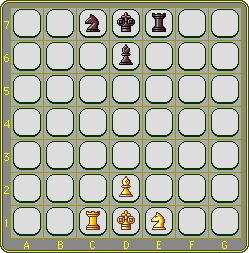Page 10 of 47
Cyclix | While Mark Steere was wrestling to get Monkey Queen, his entry into the stacking game contest, to behave properly, I was considering the 'offspring principle' it introduces as a tool rather than as the basis for a complete game. I sought implementation in a small chess type game, so it didn't take me long to consider two small and fairly revolutionary chess games I already had, Shakti and Caïssa. |
|
Caïssa has a method of capture that isn't really capture: no pieces are removed in the game, just repositioned. It occurred to me that 'recycling' captured pieces would fit that general pattern. The recycling process would be based on the Monkey Queen principle: the king moves, sprouting its offspring on the thus vacated tile. The offspring would consist of the pieces captured in the process of playing, a limited set that could thus be continuously recycled. I felt I had perceived the outline correctly and it took me a day or so to merge these ideas with the atlantis principle and fold them into the form the game eventually took, well ... almost. Of course I miss the mark sometimes. It turned out that the pieces were hampered to about the same degree by the disappearing playing area as the king. In retrospect that is what at the time led to the 'tile taking rule' in Caïssa - I should have realized that. So I introduced the rule allowing pieces to take along their tile to a square that doesn't have one in Cyclix too, a few days after its invention. It adds greatly to flexibility and adds some new 'Caïssa tactics'. | |
enschede, january 2011
christian freeling
